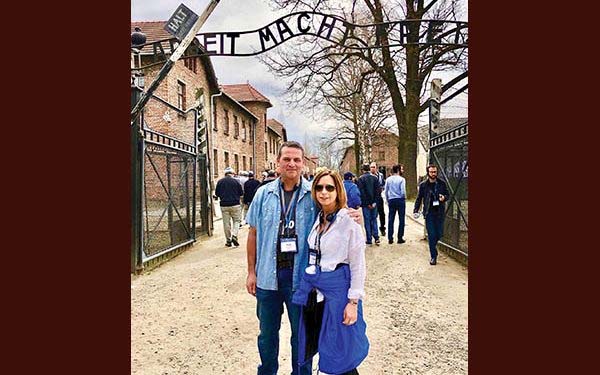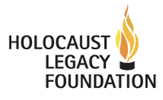by Steven A. Rosenberg
December 5, 2019

Jody Kipnis (right) started the Holocaust Legacy Foundation with Todd Ruderman (left) last year.
Jody Kipnis grew up in Malden, attended Temple Ezrath Israel and eventually became a dental hygienist. She lives in Middleton and has two children, Gillian and Ross Pergament. After a trip to Poland, Jody helped create the Holocaust Legacy Foundation and the Holocaust Legacy Fellows program with Todd Ruderman. Last summer, the program took 16 teens to visit Germany and concentration camps in Poland.
Could you tell us about your upbringing – where you grew up, a little about your parents and siblings and your family’s Jewish priorities?
I grew up in a traditional Jewish home in Malden with my parents and my two sisters. We lived in a multicultural neighborhood, and all the neighbors were friends. We attended Temple Ezrath Israel. I have very fond memories of walking to shul on the high holidays with my Jewish neighbors, working the coat check room with my friends during various temple events and helping my mother prepare family Shabbat meals as president of the sisterhood. As a teen, I was very close with TEI’s Rabbi Kummer, and my son carries on his Hebrew name.
My dad was a kosher baker and, although my mom worked as an administrative assistant in the Produce Markets in Chelsea she was always baking at home. One of things my parents taught me was that hard work was needed to be successful in life. Our home was always open to anyone who needed a place to sleep when visiting from out of town, or a place to eat. Our home became the extended stay Hotel Kipnis – my parents opened our home to family and friends, and never asked how long our guests were staying.
When did you first become interested in Judaism?
It was instilled in me at such a young age. My mom was very active in our synagogue, and when she was not home I knew where to find her. I still remember the temple’s telephone number. Although we lived in Malden, I was a member of Temple Ner Tamid’s (Peabody) USY, and Regional Board Member of BBYO New England. Over the years, I have volunteered my time on numerous boards such as JCC-Peabody, North Shore Federation, Young Leadership, JTI-Boston, and Lappin Foundation.
You started the Holocaust Legacy Foundation with your partner, Todd Ruderman last year. What moved you to create this program?
Just last year, in April 2018, we returned from a life-changing experience in Poland. We visited Auschwitz with our dear friend, David Schaecter. David survived and spent over two years of his youth in this indescribable death camp. While standing in front of David’s bunker in Auschwitz, he turned to us and said “Hear me, understand me, and tell my story.” By the end of our trip, we began to understand what David was asking. The imminent passing of survivors will occur during our children’s lifetime. This leaves the responsibility to them, and to all children, to preserve and perpetuate the memory and lessons of the Holocaust for future generations.
While on the grounds of Auschwitz, we made a promise to each other and to our beloved friend David, to preserve and perpetuate the memory and lessons of the Holocaust for future generations. We believed this could be best accomplished with ongoing Holocaust education for teens, including a first-hand visit to death camps and other Holocaust sites.
Could you explain how the program works?
The anti-Semitic challenges of today strike us as complex and affect all of us more immediately with the world more polarized than we remember. We designed the Holocaust Legacy Fellows program to prepare teens to confront and embrace these issues in years ahead. The Holocaust Legacy Fellows educates Jewish teens about the Holocaust as a watershed event in Jewish history and in the history of humanity, with the intent of broadening their world views and empowering them to positively impact the community and world. The fellowship instills in teens the responsibility to preserve and perpetuate the memory and lessons of the Holocaust through education, travel and leadership programming.
Todd and I have worked hard in order for Holocaust Legacy Fellows 2020 to have strong representation from all areas of the Greater Boston community. We have reached out to synagogues, and Jewish organizations to help us recruit top quality leaders for this program. We opened 16-20 spots for teens who stand out as the ones that demonstrate leadership and want to make the biggest difference in their community. Participants accepted into the program will be expected to attend and participate in a series of mandatory meetings through the winter and spring of 2020 and agree to fulfill all the program requirements, which consists of pre-trip assignments, journal writing and sharing, attending graduation, post-trip reflection essay of the experience and presenting one presentation about their experience at school, and to serve on the Holocaust Speakers Bureau. The highlights of the program include hearing first hand testimony from survivors before the fully subsidized trip to Poland, which will take place from August 2-11, 2020.
Last summer, you took 16 teens from Greater Boston on the inaugural trip. You went to Germany, the Warsaw Ghetto and the Treblinka and Auschwitz death camps. Could you talk about the impact the trip had on you and the teens?
When we arrived in Germany, we set out to bear witness without delay and the fellows began to immerse themselves into the genocide of the Jews as the culmination of a decade of Nazi policy, under the rule of Hilter. They wrote vigorously in their journals without instruction. We visited the Wannsee Conference Center where the Final Solution was drafted in just 83 minutes, and it consisted of gassings, shootings, random acts of terror, disease, and starvation that accounted for the deaths of over six million Jews. The teens began to understand that learning about the Holocaust requires us to examine events in history and examples of human behavior that both unsettles us and eludes our attempts to explain them. The full immensity of the crime against humanity committed in Treblinka, Auschwitz-Birkenau, Majdanek and the Buczyna Forest where 800 Jewish children were killed in one pit with hand grenades came to light for all of us. Though the Holocaust was targeted at Jews, the fact is it was carried out by humans.
The Holocaust Legacy Fellows program is not just about remembering the Holocaust but learning from it and becoming self-aware. Learning through discovery can promote a positive impact. The participants had lots of opportunities for reflection and discussion. Holocaust Legacy Fellows was designed to create an empowered community of critical thinkers who will illuminate the world with hope, respect and responsibility. This alone sets our Holocaust educational program apart from any other. The Holocaust Legacy Fellows on our pilot year behaved with the most impressive dignity and thoughtfulness. They gave us great hope that not only did they understand the horrors of the past, but the trip and the education they received meant they would be the ones who would step up in the future and challenge prejudice and hatred which paved the way to those railway lines at Auschwitz.
What’s your hope for future teens who go on this trip and how they integrate their experiences into their life as they move forward?
Each and every teen participant will play a key role in making Holocaust Legacy Fellows a success. They will have important work to do after they complete the fellowship. Their job now is to educate others about the Holocaust and to honor its victims. We have watched them listen carefully and heard them communicate clearly, to understand and appreciate the complexity of the Holocaust. They have learned to think critically and creatively, and to be nimble and resourceful in the face of uncertainty. We are confident that they will put their words into action, to engage their communities and the world to preserve and perpetuate the memory and lessons of the Holocaust for future generations. The skills they have learned through our program will stay with them for a lifetime. Our teens have taken a pledge to step forward to the challenges ahead. They will see the world as it is, and be a force for the betterment of the Jewish community. They can, and will dare greatly to stand up for what they believe in. This will enrich them and the communities they will serve.
What sustains Todd and I is hope. Hope that they are aware of the unique privilege of serving as a Holocaust Legacy Fellow and will give back throughout their lives to build a peaceful future and to be role models within their communities for conversation, companionship and compassion. Our Fellows are prepared to serve as Holocaust peer educators at their schools and a resource for communities when they need to address anti-Semitism.
As they continue to preserve and perpetuate the memory and lessons of the Holocaust for future generations, Todd and I do not want them to just share the stories of those who perished and those who survived, but to learn from the stories of those who risked their lives to save the Jews during the Holocaust. Those stories prove that random acts of kindness are not random at all. The teens have been given the tools and have the power to right great wrongs and inspire the world with hope for humanity. As they continue their journey as Holocaust Legacy Fellows, we know the goodness that bloomed in the Righteous Among the Nations like Oskar Schindler, Otto Weitz, and Janusz Korczak dwells in each of them. If we can instill in teens to remember the power that kindness brings, collectively they really could change the world.
